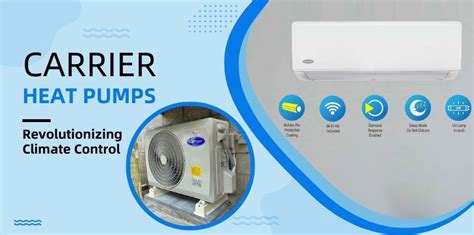Climate change has become one of the most pressing issues of our time, with rising temperatures and extreme weather events affecting communities worldwide. As we strive to reduce our carbon footprint and mitigate the effects of climate change, innovative technologies are emerging to revolutionize the way we control and manage indoor climates. Climate tech heating and cooling solutions are at the forefront of this revolution, offering sustainable, efficient, and cost-effective alternatives to traditional HVAC systems.
The Importance of Climate Control
Maintaining a comfortable indoor climate is crucial for human health, productivity, and overall well-being. Extreme temperatures, humidity, and air quality can have severe consequences, ranging from heat-related illnesses to respiratory problems. Moreover, indoor climate control plays a significant role in energy consumption, with heating and cooling accounting for nearly 50% of a building's energy expenditure.
The Challenges of Traditional HVAC Systems
Traditional heating, ventilation, and air conditioning (HVAC) systems have several drawbacks. They are often energy-intensive, contributing to greenhouse gas emissions and climate change. Moreover, these systems can be expensive to install, maintain, and repair, making them inaccessible to many individuals and businesses. Furthermore, traditional HVAC systems can be noisy, bulky, and aesthetically unpleasing, limiting their applications in various settings.
The Rise of Climate Tech Heating and Cooling
Climate tech heating and cooling solutions are designed to address the limitations of traditional HVAC systems. These innovative technologies leverage advanced materials, sensors, and software to provide efficient, sustainable, and cost-effective climate control. Climate tech solutions can be broadly categorized into two main areas: heating and cooling.
Climate Tech Heating Solutions

Climate tech heating solutions employ advanced materials and technologies to provide efficient and sustainable heating. Some of the most promising climate tech heating solutions include:
- Thermoelectric Heating: This technology converts waste heat into usable energy, reducing energy consumption and greenhouse gas emissions.
- Radiant Heating: Radiant heating systems use infrared radiation to warm objects and people, rather than heating the air. This approach can be up to 30% more efficient than traditional forced-air systems.
- Heat Pumps: Heat pumps are highly efficient and can provide both heating and cooling. They work by transferring heat from one location to another, rather than generating heat from fuel.
Climate Tech Cooling Solutions

Climate tech cooling solutions are designed to provide efficient and sustainable cooling. Some of the most innovative climate tech cooling solutions include:
- Evaporative Cooling: Evaporative cooling systems use water evaporation to cool the air, reducing energy consumption and greenhouse gas emissions.
- Desiccant Cooling: Desiccant cooling systems use a desiccant material to remove moisture from the air, providing efficient cooling in humid climates.
- Radiative Cooling: Radiative cooling systems use infrared radiation to cool the air, rather than relying on refrigerants or electricity.
Benefits of Climate Tech Heating and Cooling

Climate tech heating and cooling solutions offer numerous benefits, including:
- Energy Efficiency: Climate tech solutions can reduce energy consumption by up to 50%, lowering greenhouse gas emissions and energy costs.
- Cost Savings: Climate tech solutions can be more cost-effective than traditional HVAC systems, with lower installation, maintenance, and repair costs.
- Improved Indoor Air Quality: Climate tech solutions can improve indoor air quality by removing pollutants and moisture from the air.
- Increased Comfort: Climate tech solutions can provide more consistent and comfortable temperatures, improving overall well-being.
Real-World Applications of Climate Tech Heating and Cooling

Climate tech heating and cooling solutions have numerous real-world applications, including:
- Residential Buildings: Climate tech solutions can be used in residential buildings to provide efficient and sustainable heating and cooling.
- Commercial Buildings: Climate tech solutions can be used in commercial buildings to reduce energy consumption and improve indoor air quality.
- Industrial Settings: Climate tech solutions can be used in industrial settings to provide efficient and sustainable heating and cooling for various processes.
Future of Climate Tech Heating and Cooling

The future of climate tech heating and cooling is promising, with ongoing research and development focused on improving efficiency, sustainability, and cost-effectiveness. Some of the most exciting trends and innovations in climate tech heating and cooling include:
- Artificial Intelligence: AI-powered climate tech solutions can optimize heating and cooling systems, predicting and adapting to changing weather patterns and indoor conditions.
- Internet of Things (IoT): IoT-enabled climate tech solutions can integrate with various devices and systems, providing seamless and efficient climate control.
- Advanced Materials: New materials and technologies are being developed to improve the efficiency and sustainability of climate tech heating and cooling solutions.
Gallery of Climate Tech Heating and Cooling Solutions






What is climate tech heating and cooling?
+Climate tech heating and cooling refers to innovative technologies and solutions that provide efficient, sustainable, and cost-effective climate control.
What are the benefits of climate tech heating and cooling?
+Climate tech heating and cooling solutions offer numerous benefits, including energy efficiency, cost savings, improved indoor air quality, and increased comfort.
What are some real-world applications of climate tech heating and cooling?
+Climate tech heating and cooling solutions have numerous real-world applications, including residential buildings, commercial buildings, and industrial settings.
We hope this article has provided you with a comprehensive overview of climate tech heating and cooling solutions. As the world continues to grapple with the challenges of climate change, innovative technologies like these will play a critical role in shaping a more sustainable future. Join the conversation by sharing your thoughts and experiences with climate tech heating and cooling solutions in the comments below.
